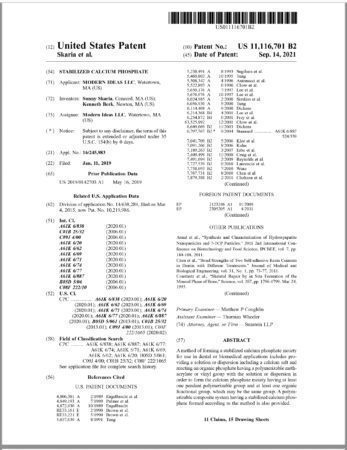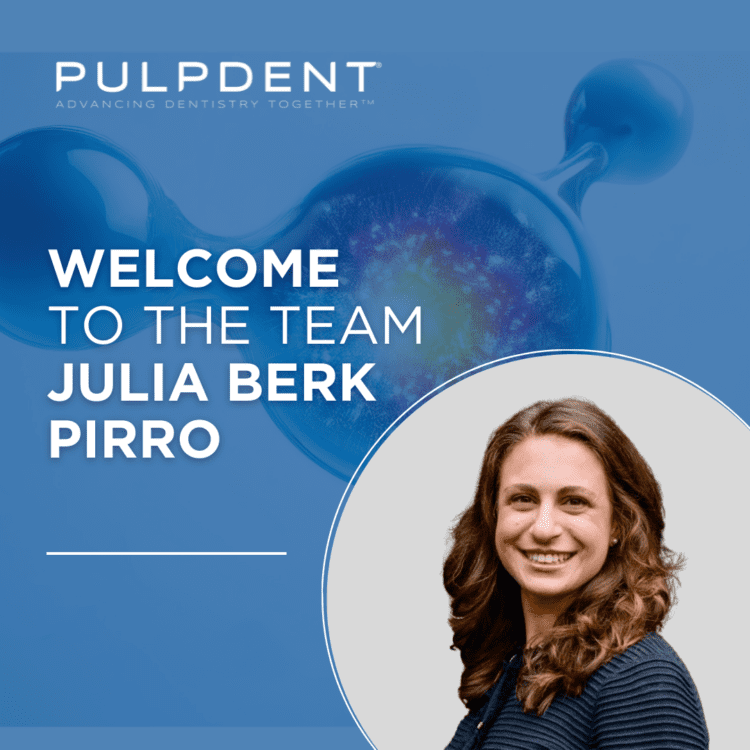The patented molecule, methacrylate-functionalized calcium phosphate, shatters ceiling for bioactivity in dentistry and ushers in new generation of highly esthetic bioactive materials
WATERTOWN, Mass. – November 28, 2021 –Pulpdent, a leading dental researcher and manufacturer, has been awarded two patents by the United States Patent and Trademark Office for a stabilized calcium phosphate molecule. When placed in a dental composite, the bioactive molecule facilitates tooth remineralization, promotes hydroxyapatite formation, and performs at the highest levels of esthetic dentistry. The discovery has the potential to impact millions of patients worldwide by significantly improving the outcomes of dental restorative procedures.
The patented molecule, a methacrylate-functionalized calcium phosphate (MCP), exists in a high-energy, transitional state at the atomic level. When placed in a dental restorative material in the oral environment, MCP transfers calcium, phosphate, and fluoride from saliva to dentin, the hard bony tissue that exists beneath the enamel in a healthy tooth, and creates scaffolding for bone growth (biomineralization). Unlike any bioactive material introduced to date, it also allows for uncompromised anterior restorations.
“The advent of Pulpdent’s two MCP patents represents the culmination of decades of research by our science team,” says Pulpdent Vice President Don Berk. “The behavior of the MCP molecule was discovered in an effort to push dentistry to a new era of restorative possibilities—one characterized by materials that actively promote tooth health while also meeting the esthetic demands of smile-zone dentistry. By introducing MCP to the marketplace and to dental professionals across the world, we’ve taken an incredible leap to fulfill our mission of fundamentally improving dental care.”
Pulpdent’s MCP molecule will be marketed under the trade name Crysta. It will be immediately available in many of Pulpdent’s restorative products, including ACTIVA Presto, ACTIVA Pronto, and Lime-Lite Enhanced.
“Our research and development team has already begun studying the use of Crysta MCP in our extensive product portfolio,” says Pulpdent Vice President Fred Berk. “We expect Crysta to quickly become a cornerstone of Pulpdent’s market success and a key differentiator in establishing standards for restorative treatment. We are at the beginning of the Crysta MCP story, and the next 10 years will see this technology shape dental practices and touch the lives of millions of dental patients in a very real way. We see the MCP patents as a once-in-a-generation development that can enhance the practice of dentistry and the longevity of tooth-color composite restorations.”
Currently, ACTIVA Presto, ACTIVA Pronto, and Lime-Lite Enhanced, Pulpdent’s market-leading cavity liner, contain MCP. The company plans to introduce MCP to additional materials, including both new and legacy Pulpdent products.
MCP’s remineralization properties resemble those that occur in natural dental tissues. Dental restorative materials containing MCP stimulate hydroxyapatite formation and become “sealed” to healthy tooth structure. As a result, restorations with MCP act as a deterrent against secondary caries, a well-known cause of dental restoration failure.
Both in vivo and in vitro research by Pulpdent demonstrated MCP’s novel ability to create nucleation sites for hydroxyapatite formation. Hydroxyapatite precipitation on the surfaces of composites was evaluated using attenuated total reflectance Fourier-transform infrared spectroscopy (ATR-FTIR), scanning electron microscopy (SEM), and energy dispersive spectroscopy (EDS).
Pulpdent’s original research, which includes the achievement of MCP-containing materials that produce optimal esthetics (tooth shade matching) and flexural strength, was recently published in the peer-reviewed journal Polymers. The article, titled “Experimental Dental Composites Containing a Novel Methacrylate-Functionalized Calcium Phosphate Component: Evaluation of Bioactivity and Physical Properties,” was authored by MCP inventors Sunny Skaria and Kenneth J. Berk. It may be found at www.mdpi.com/2073-4360/13/13/2095.
Pulpdent pioneered the introduction of esthetic bioactive dental materials in 2013 with the introduction of ACTIVA BioACTIVE-RESTORATIVE, which continues to be a leading restorative material for the company. The bioactive ACTIVA line currently includes ACTIVA BioACTIVE-CEMENT, ACTIVA BioACTIVE Base/Liner, ACTIVA Kids BioACTIVE-RESOTRATIVE, ACTIVA Presto, and ACTIVA Pronto.
Extensive independent research has validated the significance of bioactive restorative materials and their effect on patient outcomes. The field of bioactive research in dentistry continues to expand as methods of observing bioactivity and measuring bioactive-assisted outcomes becomes more highly developed.
For more information on Crysta, visit pulpdent.com/crysta. For more information on Activa Presto, visit pulpdent.com/pulpdent-products/activa-presto.
About Pulpdent Corporation—Pulpdent Corporation is a world-renowned, family-owned dental research and manufacturing company established in 1947 and headquartered in Watertown, Massachusetts. Its first product, Pulpdent Paste, is still used universally today in vital pulp and root canal therapy. Pulpdent has a proven legacy of investment in original dental research and new technologies, while also being a powerful provider of private label manufacturing in the dental marketplace. Pulpdent has achieved BPA-free manufacturing and all products are produced in its Boston-area facilities. The company strives to earn the trust of the dental professionals and inspire clinicians with materials that advance the practice of dentistry and the oral health patients.





